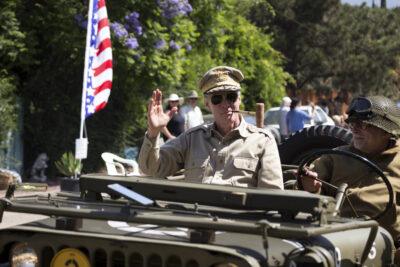![]()
Unraveling America’s Forgotten Coup Attempts
With the recent James O’Keefe video exposing a top Pentagon advisor who claimed to be meeting with generals and other top brass to stop a Trump presidency, I thought it would be interesting to look at a few military coup attempts in our country’s past.
From the founding of the United States to today, there have been moments when whispers of military plots and secret machinations haunted U.S. corridors of power.
While many of these alleged conspiracies ended before they could fully materialize, they remain fascinating chapters in American history.
This short piece explores some of the most intriguing examples of perceived or actual coup attempts, beginning with the republic’s earliest days under George Washington.
George Washington and the Newburgh Conspiracy
During the final stages of the Revolutionary War, rumors swirled at Newburgh, New York, that discontented Continental Army officers were considering drastic measures against the young government.
Soldiers had gone months without pay, and a sense of betrayal and frustration seeped through the ranks. Some officers discussed pressuring Congress into giving them what they were owed by threatening to refuse to disband. Others considered even more radical steps.
Though it never fully evolved into a violent plot, the so-called Newburgh Conspiracy caused considerable alarm. When George Washington caught wind of the scheme, he addressed the officers directly, appealing to their patriotism and urging them to respect the rule of law.
His heartfelt speech quelled the unrest, leaving historians to debate how close the nation actually was to witnessing a military takeover before its new government took root. The Newburgh Conspiracy, while not resulting in a coup, was a pivotal moment in American history that demonstrated the fragility of the young nation’s government and the importance of civilian control over the military.
Aaron Burr and the Western Conspiracy
Aaron Burr’s name frequently comes up when discussing early attempts at subverting federal authority. After serving as Thomas Jefferson’s vice president, Burr fell into political ruin following his infamous duel with Alexander Hamilton. His subsequent travels through the Western Territories fueled rumors that he planned to carve out an independent nation or even seize some Spanish lands.
Burr’s activities drew suspicion from President Jefferson, who believed Burr might be orchestrating a treasonous plot that involved fragmenting the United States. Though he was eventually arrested and tried for treason in 1807, the prosecution failed to prove that an actual military uprising was underway.
Burr walked free, but the incident left behind more whispers that generals and high-ranking figures might have entertained a coup-like scheme against the federal government.
Threats of Disunity in the Civil War Era
Although the Civil War was a massive conflict between North and South, there were often times within this period hinted at the possibility of internal military power plays. This occurred on both sides, North and South. In fact, some Confederates questioned Jefferson Davis’s leadership as defeats mounted, and a handful of Southern officers pondered removing him from power by force.
In the North, Abraham Lincoln faced intense criticism from within his own party. Yet, concerns about an outright military overthrow of the president never took full shape.
The Civil War underscored the nation’s capacity for violent division and set a critical precedent. Military leaders often held immense sway, but the tradition of civilian control over the armed forces stood firm, even during national emergencies. The United States emerged severely scarred but intact by the war’s end, forging a path toward long-term reconciliation.
The Business Plot of 1933
One of the most sensational alleged coup attempts in American history came in the early years of Franklin D. Roosevelt’s presidency. Fears about the New Deal’s expansive social programs rippled through certain circles of powerful business interests.
According to retired Marine Corps Major General Smedley Butler, a group of wealthy financiers approached him with a proposal… lead a massive veterans’ march on Washington, oust Roosevelt, and install a more business-friendly administration.
This plan, known as the ‘Business Plot of 1933 ‘, was a stark example of how fat cats with a lot of cash have conspired to achieve power by using the military.
Butler testified before Congress about the alleged conspiracy, claiming that the plot’s organizers believed his standing among veterans would facilitate a smooth transition. Congressional investigators took Butler’s warnings seriously, yet there was insufficient evidence to charge the named individuals with conspiracy.
Historians continue to debate just how real or imminent the threat really was. Still, the episode remains a reminder of the tensions that can flare when influential, elitist groups feel threatened by a president’s policies.

MacArthur’s growing public disagreements with President Harry S. Truman over war strategy led to rumors that the general might defy presidential authority.
Truman and General MacArthur
General Douglas MacArthur became a household name during WWII. His strong and able leadership increased his notoriety during the Korean War for repelling North Korean advances. However, MacArthur’s growing public disagreements with President Harry S. Truman over war strategy led to rumors that the general might defy presidential authority.
While there is no firm evidence that MacArthur seriously entertained a coup, his public opposition to Truman’s orders raised concerns that a military figure of his stature could destabilize civilian control of the government.
When Truman finally relieved MacArthur of his command in 1951, it sent a strong message about the inviolability of the chain of command. The resulting uproar over MacArthur’s dismissal simmered in the public sphere, but the general accepted the decision.
Though rumors of a coup swirled, nothing materialized beyond rhetorical posturing and heated political debate. At the end of the day, MacArthur stood down, and the rest is history.
Lessons and Legacies
Unlike many countries, the United States has avoided outright military coups that topple elected officials. Still, the episodes mentioned above underscore an enduring tension between civilian leadership and the military.
Each alleged or genuine plot, whether the frustrated officers at Newburgh or the businessmen who reportedly sought to replace Roosevelt using the military, illustrates the complex interplay of personal ambition, economic interests, and political ideology.
Such stories remind Americans that our Republic, while resilient, should never be taken for granted. The principle of civilian control over the armed forces is a central pillar of the Constitution, a safeguard intended to preserve the foundational ideals of liberty and self-governance.
Vital Checks And Balances
The history of secret plots and unexecuted schemes demonstrates that even in a stable Republic, vigilance is necessary to ensure that power remains accountable to the people. The Constitution, with its provisions for civilian control along with checks and balances, has played a crucial role in preventing coups in the United States.
Across the centuries, these moments of intrigue have served as warnings about the fragility of political systems. Though none of these plots succeeded in upending an American president, their existence underscores that power is never immune to challenge.
Studying these episodes should foster a deeper appreciation for the country’s Constitutional traditions and the delicate balances that have kept them intact.



























